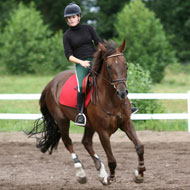
Riders need tools to ensure they are the correct weight for their horse
Horses that are affected by inappropriate horse/rider weight proportions can suffer a range of problems, according to experts at a recent forum.
Last month a meeting was hosted by the British Equestrian Federation and World Horse Welfare. Guests included senior representatives from across the equine spectrum.
Whilst only a small proportion of horses are affected, those that are can suffer muscle fatigue and loss of muscle tone which compromises the skeletal frame.
Other issues include stumbling and/or falling, compromised performance, behavioural issues and horse and rider safety.
There is a belief that having a large rider on a small horse is the issue, but in fact, unbalanced or unfit riders can have a similar impact.
The group plans to look for innovative ways for riders to check if they are the correct right for their horse. They will also explore pre-riding fitness initiatives and develop guidance to support judges and officials to help prioritise the welfare of the horse.
World Horse Welfare's deputy chief executive, Tony Tyler, said: “This is certainly not about stopping people from riding - it is simply trying to ensure they are mounted correctly so their horse is not compromised.
"If the right guidance can be put in place both horses and riders will benefit; after all you won’t get the best performance or enjoyment from your horse if it is struggling to carry you.
"The group felt that there were ways forward that can reduce the number of horses affected, to the obvious benefit of the horses."



 RCVS Knowledge has welcomed Professor Peter Cockcroft as editor-in-chief for Veterinary Evidence.
RCVS Knowledge has welcomed Professor Peter Cockcroft as editor-in-chief for Veterinary Evidence.